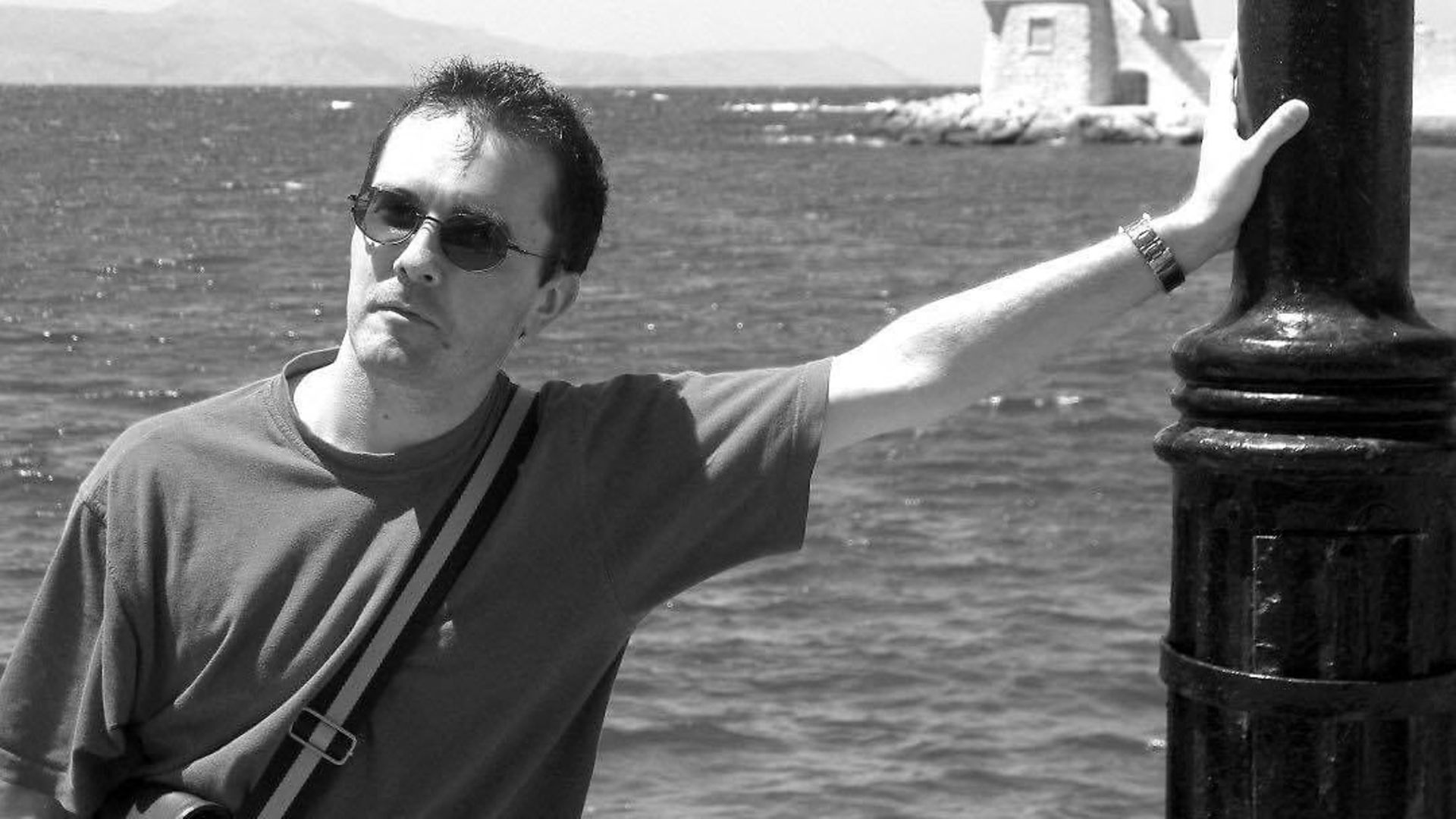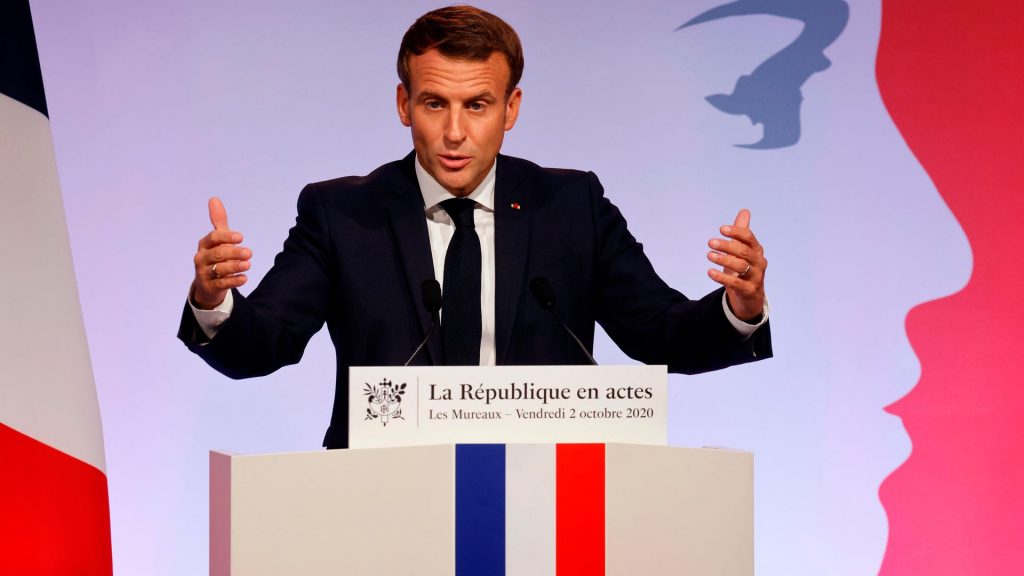
A quiet town perched on the banks where the Seine and Oise rivers meet, Conflans-Sainte-Honorine is not one of Paris’s notorious banlieues. Around 20 miles northwest of the capital, it is certainly in its orbit but the quiet streets and restrained, low-rise buildings mean it feels more provincial French than Parisian. Pleasant, and rather unremarkable.
Certainly the town, known if at all for barge cruises, is not the kind of place anyone would have in mind when they think of France’s struggles between the official ideology of secularist laïcité and radical Islamism.
Then again, Conflans is less than 10 miles from Les Mureaux, the town where, on October 2, French president Emmanuel Macron chose to give a long-awaited and controversial speech unveiling plans for promoting French republican ideals against the threat of Islamism.
Those two forces clashed in Conflans in the most horrific way last Friday, just hours before France entered its first night of new curfew restrictions intended to contain the coronavirus pandemic.
A teacher – 47-year-old Samuel Paty – was beheaded in the town, apparently in revenge for teaching a junior high school history class on secularism which had included showing his students the infamous Charlie Hebdo cartoons of the prophet Mohammed.
His attacker, a young Chechen called Aboulakh Anzorov, is said to have acted after seeing Paty denounced online. He filmed himself killing and beheading the teacher outside the gates of his school, and shared the video with fellow ISIS supporters, before he was shot dead by police.
The extraordinary brutality has refocused France’s attention on that speech by Macron earlier this month, and on an issue that strikes right at the heart of the Republic.

At the time, the speech raised more than a few eyebrows, particularly abroad, with its focus on reforming Islam in France. Fresh from his breathtaking visits to crisis-hit Lebanon where he laid down the law to its rulers, Macron was now going to reform not only someone else’s country, but an entire religion.
Cynics accused him of mouthing tired, boilerplate French rhetoric. Others went further: the president was courting voters tempted by far-right leader Marine Le Pen, hammering France’s Muslims in an attempt to outflank the leader of the National Rally.
But the murder of Paty has been followed by not just more rhetoric, but robust action. Within days the French state had swung into action: police swooped, arresting dozens of suspected militants and interior minister Gérald Darmanin announced a mosque in Pantin, a suburb of eastern Paris, was to be shut down for six months, accused of fomenting anger at Paty that contributed to his assassination. The head of an Islamic NGO, BarakaCity, was also arrested, and it and another the Collective Against Islamophobia in France were accused of supporting a campaign of intimidation against the late teacher, and the interior minister is seeking to have boths groups closed down. Darmanin told Europe 1 radio that the actions were intended to “send a message: not a minute’s respite for the enemies of the Republic”.
The depressing truth, of course, is that both rhetoric and robust action have been deployed before. Once again, an atrocity has embroiled France in a battle to defend its values, and exposed the apparent tensions between the rights of individuals and those of groups – the latter being a concept that does not really register in France.
But France will need more than state action, it will need societal action, and this may prove elusive in an already fatigued country. Solidarity is on display, but 2020 is not a year that gives itself to collective action.
On Sunday crowds, including senior politicians, gathered at Place de la République in Paris. The crowd was thousands strong, but noticeably smaller than following the January 2015 attacks on the Charlie Hebdo offices and coordinated attacks on Paris in November 2015. Whether the masked crowd was thinned out by fears of the coronavirus pandemic or simple weariness cannot be known.
Tensions between France and radical Islamism have never been far from the surface in recent years. September saw the beginning of the trial of 14 people accused of being accomplices in the attack on Charlie Hebdo, while on September 25 a grim echo rang out when an 18-year-old man stabbed and wounded two people in a terrorist attack outside the newspaper’s long-closed offices.
Earlier in October when president Macron announced his vision to reform Islam in France, which he said was “in crisis all over the world” he sparked backlash from Muslim leaders. And from Anglophone liberals.
While in the past Macron has been at pains to distinguish between Islam as a whole and the radical Islamist ideology that has battered France in recent years, critics complained that the distinction was now being made too slippery. In his speech Macron admitted the French state was partly responsible for “ghettoisation”, and that the country’s policy of integration had suffered “failings”. “Where we stepped away, they stepped in,” he said of a minority of radicals among France’s Islamic community.
He announced measures he said were intended to repair French unity, including a proposed ban on home schooling, and increased oversight on the overseas funding of mosques.
Despite acknowledging the scarring caused by France’s colonial history and insisting that Muslims should not be stigmatised, some saw nothing more than a finger being pointed.
But Macron’s rhetoric will have been familiar to any observer of French politics: secularism was front and centre. No religious law could exist above French law, he said, and “secularism is the cement of a united France”.
Macron announced plans to expand a 1905 law that separates religion and politics, something that is at the centre of much Anglophone confusion about French politics: the French conception of secularism, laïcité, differs subtly from the simple and more familiar American-style separation of church and state.
Intended to keep the influence of the Catholic church at bay, laïcité was a founding principle of modern France. However, the challenge today is not the power of Rome but demographic change in France as well as, arguably more importantly, the growth of “communitarian” group-based politics worldwide, both of which come as a challenge to French self-conception as the repository of universal humanist values.
Make no mistake, though: the country takes this very seriously. Indeed, French law forbids even the government from collecting statistics on ethnicity and religion. To outsiders this makes ethnic and religious minorities invisible; to the French it makes them French.
In France, the political ideas of the individual and of the republic take precedence over any group identity, but, as a result, foreigners – or immigrants – often view laïcité not as a level playing field but discrimination in action.
Everyone is free to worship as they please, but religion is to have no place in French state institutions – including, notably, schools. In fact, horror at Paty’s murder was intensified because of the symbolic role of teachers in passing on republican values.
Liberalism is not a term much used in France, and when it is used it tends to be in reference to free-market economics. Individual freedom, from freedom of conscience to freedom of speech, is conceived of differently and much of the French politics, from far left to hard right, is contained within the spectrum of republican opinion.
Enlightenment ideas brought to the fore by the French Revolution still have currency in the country. In particular, drawing on the philosophy of Jean-Jacques Rousseau – and drawing on philosophy is not something that results in sniggers in France – the “general will” must prevail over the particular will of sub-groups.
Indeed, politicians of left and right alike rallied around the Republic following Paty’s murder. There are exceptions, of course. The far right has never quite accepted French republicanism, though much of Marine Le Pen’s success has been in guiding it closer toward political orthodoxy. On the far left, meanwhile, the growing influence of ideas from the Anglophone world has proved a challenge, with the stirring of communitarian ideas that run counter to French universalist values.
Hypocrisies do exist, however. France outlaws ‘hate speech’, leaving it open to accusations of giving preferential treatment and double standards. Whether France can overcome this and prove that it truly is a country where citizenship is equal and open to all is what Macron must now prove.
In the meantime, he can expect limited support from other Western countries who often view French politics as uniquely obsessive and activist on questions of religion.
Likewise, at home the pressure will be on to crack down harder on religion in public life, potentially leaving him open to accusations that the real target of French opprobrium is not radical Islamism but Islam itself.
Still, following Paty’s murder, Macron will likely shrug-off criticism, particularly now that even his political opponents have rallied to the same call for the indivisibility of citizenship of the French republic.









